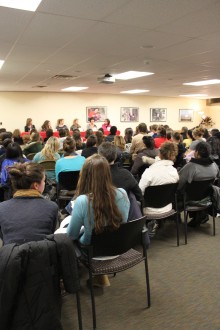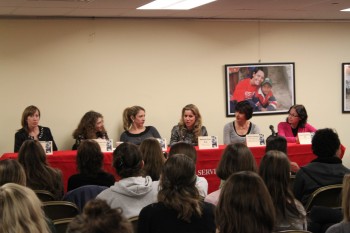Whether we want to admit it or not, body image is a major issue for women, and especially for college students. It is estimated that fifteen percent of college-aged females suffer from a clinical or subclinical eating disorder.
On Wednesday, the Howard Thurman Center hosted an event by the Boston University Wellness Program called “Lovin’ the Body You’re In.” The event featured six panelists of varying backgrounds who shared their stories and insights on the subject of body image.
“Lovin’ the Body You’re In.” The event featured six panelists of varying backgrounds who shared their stories and insights on the subject of body image.
The event began with a talk from Dr. Kim Dennis. Dennis is currently the Medical Director at Timberline Knolls, a treatment center for people with eating disorders outside Chicago. She spoke about the eating disorder she developed in college. “The transition from high school to college is one of the critical times when we see the emergence of eating disorders,” Dennis said. “There are lots for reason to that…. For me it came from coming to college and feeling like I was missing something, like I wasn’t good enough and people were going to find that out somehow.” She was an athlete and a straight-A student on a fast track to medical school, but she struggled with her relationship with food.
Finally, towards the end of her career as a med student, it was her family’s intervention that pushed her to look for quality help. “I started seeing a therapist who really saved my life… he told me to go to support groups. My immediate response was ‘hell no.’ I was always used to doing things on my own and doing things better than you… probably the best thing that I did was to go to recovery support groups, to connect to other human beings.”
Connection was a common theme in the advice given by all the panelists. “I’ve learned over the years it helps to be mindful and in tune with yourself. Be gentle,” said Whitney Post, president of Eating for Life Alliance and former college athlete. “But also involve other people in the process, too.”
An anonymous senior on the figure skating team who herself once struggled with anorexia suggested the possibility of forming a support group to promote this dialogue. But according to Margaret Ross, the director of Behavioral Medicine through Student Health Services, trying to form support groups that would facilitate an open conversation is difficult. “It’s hard to get people to come,” she said. This was despite many on-campus efforts that have happened in the past.
Towards the end of the discussion, the panel was asked to describe the impact that the media had on body image. Ross used the example of a famous experiment in Fiji by Dr. Ann Becker. She measured no evidence of eating disorders before the introduction of western television in Fiji’s culture. But once foreign programming was introduced, the incidence of eating disorders skyrocketed.

While social media sites like Facebook offer great networking opportunities, they also provide new opportunities to be judged and new avenues for insecurity. For that reason, it is more important than ever to pay attention to the warning signs of eating disorders from which our peers may be suffering. While Post acknowledged that it can be a difficult topic to bring up, she says, “it’s always okay to say ‘I’ve noticed you’re not yourself.’”

One Comment on ““Lovin’ the Body You’re In” Panelists Weigh in on Eating Disorders”